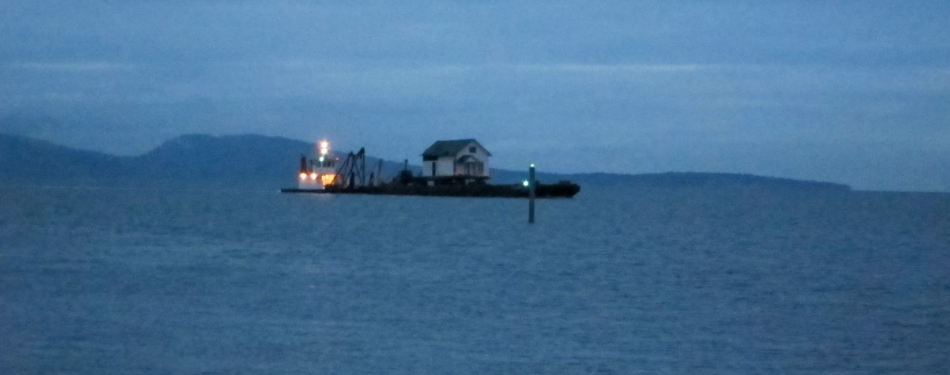||| FROM KUOW.ORG ||| REPRINT AT REQUEST OF ORCASONIAN READER
If you can find a place to live and work on Washington’s Orcas Island you’re set. But workers and business owners don’t want more yurts, cabins, and tents. They want creative solutions for after the big tourism season.
The idyllic horseshoe-shaped island boasts beautiful skylines, lush forests, pristine lakes, and short distances to the beach.
“It’s a different way of life compared to much of the mainland,” said Amy Nesler, a Communications and Stewardship Manager for San Juan Islands Visitor Bureau.
For residents and workers, it’s not enough to be beautiful. Affordability is a key concern year-round and seasonally.
“There’s been a lot of economic stress because tourism is one of our biggest industries,” Nesler said.
She says Covid-19 is not the sole reason behind challenges and that “some of it is just normal flux of trying to run a business on an island.”
Residents point to short-term rental sites like Airbnb and VRBO as a popular scapegoat. But, resident Gillian Smith, writes in an email that it’s hard for the community to reach a consensus on whether short-term rentals actually pose a risk.
“Locals hoping to make money from the short-term rental industry don’t want to lose the ability to profit off of their properties,” Smith said. “Many have pinned their hopes, plans for the future, retirements on being able to do so.”
Smith says regardless of the arguments, new solutions are needed.
Amy Nesler agrees.
“We don’t necessarily have the zoning areas to create a new neighborhood” she said.
Nesler offers that the island should seek out creative solutions, like “maybe we need to build some tiny homes instead of condos.”
Yurts, tents, trailers, and cabins
Seasonal workers, employers, and fellow islanders are navigating the landscape trying to find places to live, sometimes giving up comfort.
Temporary housing solutions are a dime a dozen. Yurts, tents, trailers, and cabins are a norm for many employees seeking temporary employment in the summer. And, if you move jobs, you likely move housing as well.
“You might find people who have been living on Orcas who have never had an Orcas address,” Jammal Williams said, adding that life on the Islands revolves around a scarcity of housing.

CREDIT: COURTESY OF JAMMAL WILLIAMS
Williams worked on Orcas Island in the winter of 2018 and 2019. At that time he lived in employee housing. He found work as a cook, housekeeper, and casual fine dining server.
In the summer of 2021, he tried to move back to the area. He planned to move to Friday Harbor on San Juan Island. He found three jobs, but had no luck with housing.
“My credit score wasn’t high enough and the landlord wasn’t comfortable renting to me,” he says.
He is currently based in Houston, Texas taking care of family.
The employee housing debate
Employee housing meets the needs of many workers. For businesses that can afford it, it’s a tangible solution.
Jocelyn Cecil, the co-owner and manager of Hogstone Wood Oven in Eastsound on Orcas Island, says her business is taking on the challenge.

CREDIT: KUOW/BRANDI FULLWOOD
For the upcoming season, Hogstone aims to rent and subsidize condos to their employees.
“If we don’t take a small hit, we may not be able to have anyone work for us,” Cecil said.
Hogstone Wood Oven is temporarily closed until spring due to renovations.
**If you are reading theOrcasonian for free, thank your fellow islanders. If you would like to support theOrcasonian CLICK HERE to set your modestly-priced, voluntary subscription. Otherwise, no worries; we’re happy to share with you.**









I listened to that show.
I was disappointed that the first person they interviewed was the woman from the visitor’s bureau. That was the wrong way to start a show about housing issues. The visitor’s bureau is basically “pimping” for the short-term rentals. The next person they interviewed moved to Texas. Don’t know why the show went there at all.
Huge money is being made off this rental model and it is in need of a “correction”.
Time to start taxing the short-term rentals in San Juan County big time. Tax them more than local residents that actually contribute to the community and live and work here.
Kudos to Hogstone for taking care of their workers’ housing needs. Just makes good economic sense for all concerned. But individual employers can’t solve the problem alone; a systemic solution is needed (listen up Visitors’ Bureau and San Juan County). PS–Tiny homes are not that solution any more than yurts.
John, I sense some animosity toward short-term residents. In fact, part time residents pay the same tax rate as full time residents while using far fewer services like roads, schools, and health care. Why shouldn’t people pay for their fair share of the services they use? I believe there is substantial evidence that renters tend to make purchases on the island including going out to eat, buying groceries, and souvenirs, and so there is also tax revenue generated that way. Have a pleasant evening.